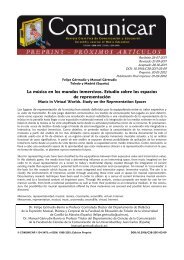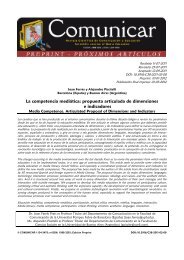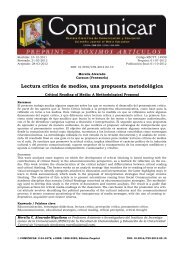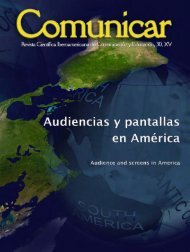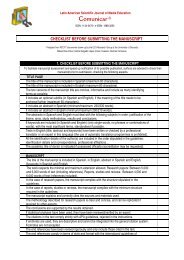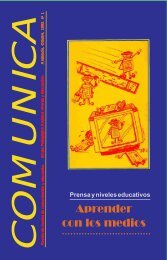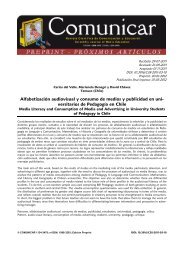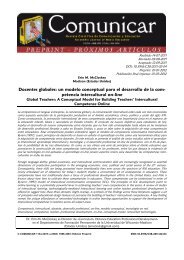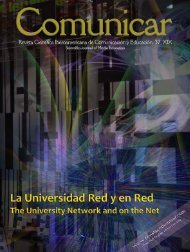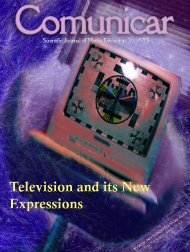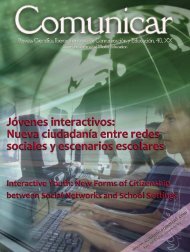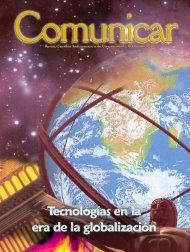Comunicar 39-ingles - Revista Comunicar
Comunicar 39-ingles - Revista Comunicar
Comunicar 39-ingles - Revista Comunicar
Create successful ePaper yourself
Turn your PDF publications into a flip-book with our unique Google optimized e-Paper software.
74<strong>Comunicar</strong>, <strong>39</strong>, XX, 20121. IntroductionWhat does it mean to be an engaged citizen inone’s community or in the world? Is voting in a localor national election a sign of active participation? Orhave recent changes in technology created an opportunityand an expectation for a new kind of participatorycitizenry; one in which engaged citizens are thosewho blog, post, tweet, upload, create and otherwiseinteract with others online as proof of their deep involvementor commitment to their community or nation?The news media reported on this unfolding realityin 2011 as numerous individual communities andcountries relied on online forums and discussions, citizenjournalists and photo-journalists, and communitybloggers to set the agenda for civic discourse and eventually,for civic action. From the Arab uprising in severalAfrican countries to the «Occupy» movements startingon Wall Street in New York City and later takingplace across the globe, citizens are taking advantage ofthe portability, accessibility, speed and viral-nature thatonline civic engagement affords. Participatory cultureis «where members believe that their contributionsmatter» according to Jenkins (2006) in his paper«Confronting the Challenges of Participatory Culture».For adults, these methods of engagement often tapinto the cultural paradigms in which we live. How,then, are young people to gain the thoughtful, analyticalskills necessary to engage as strong civic participants;whether in their local community or a morenational stage?«Interactivity is a property of the technology, whileparticipation is a property of culture. Participatory cultureis emerging as the culture absorbs and responds tothe explosion of new media technologies that make itpossible for average consumers to archive, annotate,appropriate, and recirculate media content in powerfulnew ways. A focus on expanding access to newtechnologies carries us only so far if we do not also fosterthe skills and cultural knowledge necessary todeploy those tools toward our own ends» (Jenkins,2006).Democratic governance requires both an informedcitizenry and a citizenry free to express opinions. Thisfreedom is enshrined in the founding documents ofmany nations and also international organizations. It isfound in the Constitution of the United States in theFirst Amendment to the Bill of Rights. It is also expressedin Article 19 of the University Declaration ofHuman Rights adopted by the United Nations in1948.In western democracies a guarantee for this freedomwas sought through private ownership of thepress, rather than government ownership. The authorsof «Four Theories of the Press» identified fourpossible systems, each with a different relationship betweenthe press and the state, including the SocialResponsibility Theory and the Libertarian Theory.Private ownership was just one of the ways in whichit was thought the «right» information could be sharedand an informed citizenry created (Seibert, Petersen &Schramm, 1963).The evolution of modern media corporations hasshown that this attention to ownership structures didnot adequately describe the conditions necessary forengaging citizens in dialogue. Modern media corporationswere privately owned, but it was not clear thatthese corporations always provided a channel throughwhich citizens could sufficiently express themselves.Often citizens were put in the position of consumingnews and information rather than expressing theirneeds and viewpoints as active participants. But realdiscussion must take place. Real disagreements mustbe aired and real compromises must be sought.(Gutmann & Thompson, 1998) This is sometimesreferred to as a discursive theory of democracy.Deep discussion among citizens about their specificneeds and interests is of paramount importance ifan active citizenry is desired. This balance of theoryand practice is a core component of Paolo Freire’sconcept of «praxis» or informed action. Freire believededucation functions most successfully when teacherand student both use their voice for dialogue and discussionand that it is through that, sometimes difficult,dialogue that true alignment and action can take place(Freire, 2007). The concept of Participatory ActionResearch expands on Freire’s work by recognizing thatsocial change requires all involved parties to examineand discuss an issue or topic in order to change andimprove it (Wadsworth, 1998). Often these discussionshave taken place in public spaces, such as villagesquares. Today, this sort of participation takes placeincreasingly online, through mobile phones or othereasily accessible technologies. For youth, this discussionoften takes place in the classroom or an informaleducational environment.Henry Jenkins’ call to develop the skills and cul -ture knowledge necessary to deploy these tools speaksto the need for educational institutions to respond tothis new requirement of civic engagement by teachingthe necessary skills in the classroom. Civics lessons inmiddle and high school too often utilize a curriculumbased on antiquated methods of civic engagement. Aposition statement from the National Council for theSocial Studies states, «In the twenty-first century, par-© ISSN: 1134-3478 • e-ISSN: 1988-3293 • Páginaa 73-80



